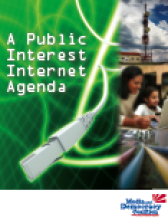While I try to keep postings on this site to the subject of publicly owned networks, I think it important to discuss the ways in which some major carriers routinely flout the public interest. Thus, a little history on how Comcast has acted against the public interest.
Most of the readers of this blog are probably aware that Comcast has been dinged by the FCC following its practice of interfering with subscribers legal content (and undoubtedly illegal content as well) by blocking and disrupting the BitTorrent traffic. BitTorrent is frequently used to transfer large media files because it efficiently breaks large files into many little pieces, allowing the user to download from a variety of sources concurrently - the file is then reassembled.
When Comcast detected BitTorrent connections, it would effectively hang up on them, regardless of the congestion level on the network at the time. The FCC (the Bush Administration's FCC) said it couldn't do that and Comcast is currently in the courts trying to tell the FCC that it can't tell Comcast what it can't do on its network.
Prior to a journalistic investigation that proved Comcast was doing this, net geeks had repeated asked Comcast if it were blocking the BitTorrent protocol. Comcast never admitted to anything, often claiming it did not "block" anything... as time would go on, Comcast would refuse to admit it was blocking anything - as if permanently delaying traffic was anything other than a blockage. "I'm not blocking you, try back in 20 million years."
Around this time, Comcast quietly changed its policy regarding the maximum amount of bandwidth subscribers could consume in a month. At the time, I thought it was a result of the FCC cracking down on the arbitrary policies frequently used by cable companies, but it turns out we can thank the State of Florida for forcing Comcast to enact a transparent cap on monthly usage.
Prior to the official cap, there was an unofficial cap. Every month, some number of people would be notified they were kicked off Comcast's service for using too much bandwidth - but no one knew how much was too much and, perhaps more importantly, how to keep track of how much bandwidth they were using. Discussions on geek-hangout Slashdot suggested a monthly cap of between 100 Gigabytes and 300 Gigabytes depending on the neighborhood.




